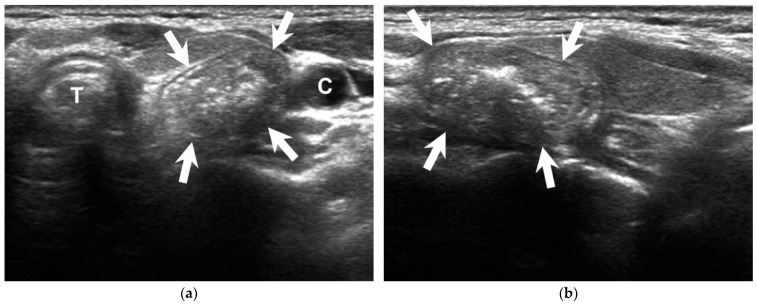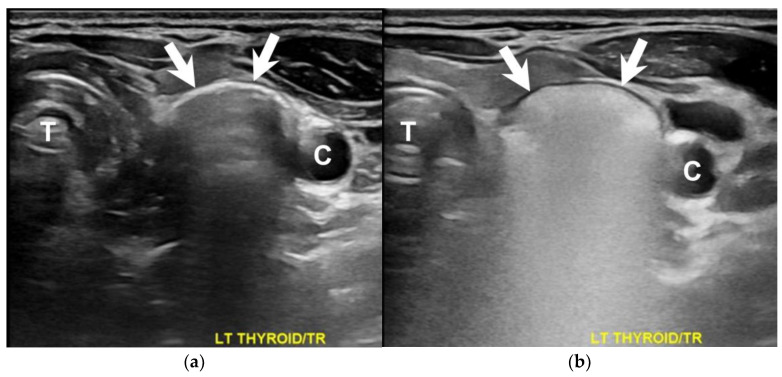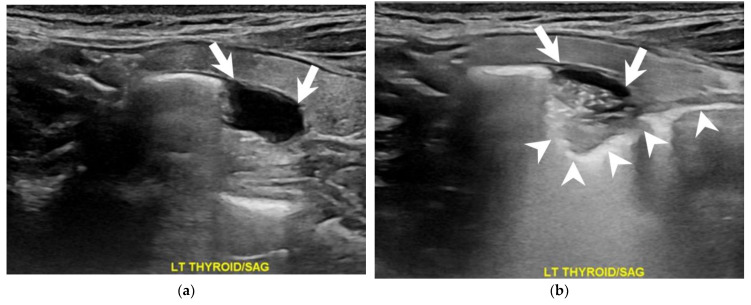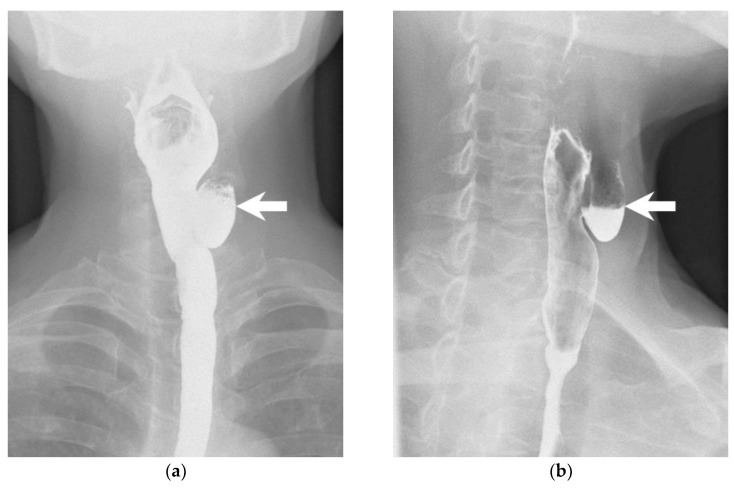Abstract
A 66-year-old woman presented with an incidental left thyroid nodule during a health examination. She had no voice change, shortness of breath, cough, or dysphagia. Repeated sonography showed a dynamic change of the lesion, which was more evident following soda consumption. A subsequent esophagography confirmed the diagnosis of a Killian–Jamieson diverticulum. This rare left-sided pharyngoesophageal diverticulum is often asymptomatic. On a sonography, air bubbles in the esophageal lumen can cause a ring-down artifact that mimics microcalcifications, which are characteristic of thyroid malignancy, and misdiagnosis may lead to unnecessary interventions, including fine-needle aspiration or thyroidectomy. A dynamic ultrasound, specifically done during soda consumption, offered a simple diagnostic distinction. No surgical intervention was pursued; the patient was monitored in the clinic.
Keywords: Killian–Jamieson diverticulum, thyroid nodule, thyroid cancer, microcalcification, ultrasonography, esophageal diverticulum, esophagography, ring-down artifact
A 66-year-old woman presented to the surgical clinic for further management of an incidental left thyroid nodule detected during a routine health examination (Figure 1, arrows). She denied experiencing voice changes, dysphagia, cough, or shortness of breath. Initial assessments documented in the referral sheet indicated normal thyroid function tests, and the fine-needle aspiration cytology showed the presence of some benign-appearing follicular cells. Repeated sonography showed a 2.3 cm lesion on the posterior aspect of the left thyroid. Notably, dynamic changes in size and shape were observed during swallowing (Figure 2 and Figure 3, Videos S1 and S2). A subsequent esophagography confirmed the diagnosis of Killian–Jamieson diverticulum (Figure 4, arrows).
Figure 1.
Transverse (a) and sagittal (b) sonographic images show a heterogeneous mass (arrows) with punctate echogenic foci on the posterior aspect of the left thyroid gland. C = carotid artery, T = trachea.
Figure 2.
A transverse view of the dynamic sonography during swallowing depicted discernible changes in the lesion (arrows) prior to (a) and following (b) soda administration. C = carotid artery, T = trachea.
Figure 3.
A sagittal view of the dynamic sonography during swallowing illustrated noticeable changes in the lesion (arrows) before (a) and after (b) the introduction of soda. The flow of soda traversed through the lesion and descended into the esophagus (arrowheads).
Figure 4.
An esophagogram obtained with the patient in a frontal (a) and lateral (b) position shows a 1.8 cm Killian–Jamieson diverticulum on the left side (arrows).
A Killian–Jamieson diverticulum is a rare, usually asymptomatic, pharyngoesophageal diverticulum on the left side [1]. Occasionally, it may lead to symptoms such as dysphagia, regurgitation, a sensation of a lump in the throat (globus sensation), and even aspiration pneumonia, as reported in some cases [2]. Anatomically, a Killian–Jamieson diverticulum protrudes from a gap in the anterolateral wall of the esophagus, located below the cricopharyngeal muscle [3]. This is in contrast to the more commonly encountered Zenker’s diverticulum, which originates in the posterior esophageal wall and is situated above the cricopharyngeal muscle [3]. Despite their differing locations, both conditions are classified as false diverticula since the pouch only contains mucosa and submucosa, lacking the full layers of the esophageal wall [3]. On a sonography, air bubbles in the esophageal lumen can cause a ring-down artifact that mimics microcalcifications, which are characteristic of thyroid malignancy, and misdiagnosis may lead to unnecessary interventions, including fine-needle aspiration or thyroidectomy [1,4,5]. To differentiate between a Killian–Jamieson diverticulum and thyroid nodules, the use of a dynamic sonography during swallowing plays a crucial role in identifying distinct changes in the contour of the lesion. Moreover, the administration of soda during the examination can enhance the passage of air through the diverticulum, intensifying the discernible changes and facilitating accurate differentiation (Videos S1 and S2) [6]. In this scenario, soda plays a role similar to that of a contrast medium, and its application aligns with the evolving field of contrast-enhanced ultrasounds [7]. In the case presented, the patient was referred to a thoracic surgeon for potential surgical intervention. However, she chose to pursue conservative management due to the absence of symptoms.
Supplementary Materials
The following supporting information can be downloaded at: https://www.mdpi.com/article/10.3390/diagnostics13193128/s1, Video S1: Transverse view of dynamic sonography during swallowing. Video S2: Sagittal view of dynamic sonography during swallowing.
Author Contributions
Conceptualization, S.-I.L. and T.-J.L.; data curation, C.-L.C.; writing—original draft preparation, T.-J.L.; writing—review and editing, S.-I.L.; supervision, C.-L.C. All authors have read and agreed to the published version of the manuscript.
Institutional Review Board Statement
Not applicable.
Informed Consent Statement
Informed Consents that include consent for research publication were obtained from all subjects involved in the study.
Data Availability Statement
Data are contained within the main text of the manuscript.
Conflicts of Interest
The authors declare no conflict of interest.
Funding Statement
This research received no external funding.
Footnotes
Disclaimer/Publisher’s Note: The statements, opinions and data contained in all publications are solely those of the individual author(s) and contributor(s) and not of MDPI and/or the editor(s). MDPI and/or the editor(s) disclaim responsibility for any injury to people or property resulting from any ideas, methods, instructions or products referred to in the content.
References
- 1.Kim H.K., Lee J.I., Jang H.W., Bae S.Y., Lee J.H., Kim Y.S., Shin J.H., Kim S.W., Chung J.H. Characteristics of Killian-Jamieson diverticula mimicking a thyroid nodule. Head Neck. 2012;34:599–603. doi: 10.1002/hed.21575. [DOI] [PubMed] [Google Scholar]
- 2.Haddad N., Agarwal P., Levi J.R., Tracy J.C., Tracy L.F. Presentation and Management of Killian Jamieson Diverticulum: A Comprehensive Literature Review. Ann. Otol. Rhinol. Laryngol. 2020;129:394–400. doi: 10.1177/0003489419887403. [DOI] [PubMed] [Google Scholar]
- 3.Constantin A., Constantinoiu S., Achim F., Socea B., Costea D.O., Predescu D. Esophageal diverticula: From diagnosis to therapeutic management-narrative review. J. Thorac. Dis. 2023;15:759–779. doi: 10.21037/jtd-22-861. [DOI] [PMC free article] [PubMed] [Google Scholar]
- 4.Chen X., Liu J.F., Gu C.J., Ding S.J., Zhou S.X., Chen X.Y., Ni X.J. Ultrasonographic characteristics of Killian-Jamieson diverticula. J. Clin. Ultrasound. 2021;49:527–532. doi: 10.1002/jcu.23011. [DOI] [PubMed] [Google Scholar]
- 5.Cao L., Ge J., Zhao D., Lei S. Killian-Jamieson diverticulum mimicking a calcified thyroid nodule on ultrasonography: A case report and literature review. Oncol. Lett. 2016;12:2742–2745. doi: 10.3892/ol.2016.4984. [DOI] [PMC free article] [PubMed] [Google Scholar]
- 6.Kim T.H., Kim S., Chang K.S. Simple method of using soda for distinguishing Killian-Jamieson diverticulum from a thyroid nodule. Endocrine. 2015;48:351–352. doi: 10.1007/s12020-014-0268-0. [DOI] [PubMed] [Google Scholar]
- 7.Radzina M., Ratniece M., Putrins D.S., Saule L., Cantisani V. Performance of Contrast-Enhanced Ultrasound in Thyroid Nodules: Review of Current State and Future Perspectives. Cancers. 2021;13:5469. doi: 10.3390/cancers13215469. [DOI] [PMC free article] [PubMed] [Google Scholar]
Associated Data
This section collects any data citations, data availability statements, or supplementary materials included in this article.
Supplementary Materials
Data Availability Statement
Data are contained within the main text of the manuscript.






